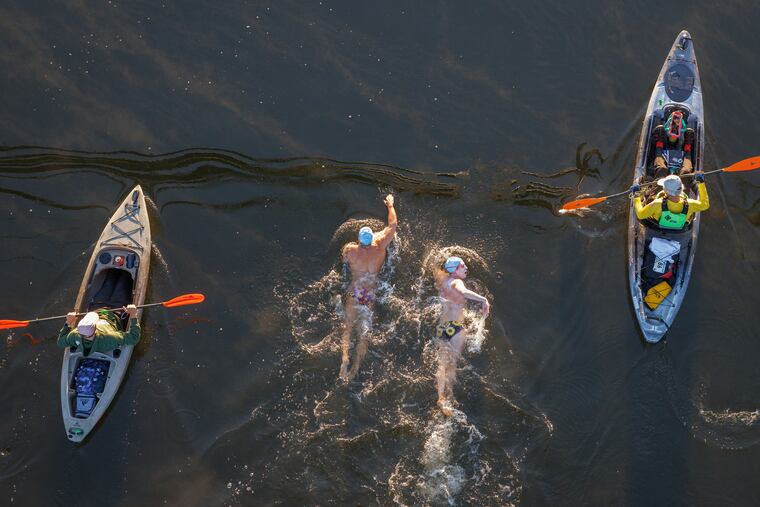They say the Schuylkill is lovely for swimming this time of year
Forget the river’s bad reputation. These aquanauts are jumping in.

On a recent morning, the Schuylkill looked like some mythical forest pond: Mist rose above a patch of water near Norristown as a group of swimmers bobbed in colorful caps, preparing to race.
Despite what their neighbors and friends and colleagues say about the river, these swimmers immerse themselves anyway — often, and for long amounts of time. They use words like “delightful,” “lovely,” “really clean,” and “quite nice” to describe the water. Sure, they know about the Schuylkill’s stubbornly persistent PR problem — but they also know about the otters that play on the banks, and how you can see clamshells on the river bottom if you open your eyes underwater.
“Most people have this mentality that the Schuylkill is dirty and it’s disgusting and ‘I don’t ever want to go there.’ Believe it or not, that is left over from our grandparents’ generation,” said John Kenny, the founder of French Creek Racing, an open-water training company that hosted the recent Charles Bender Memorial Swim near Norristown.
Participants in the most challenging category gathered at dawn for a 15k, three-hour-plus loop through the river. A phalanx of red and purple kayaks, stocked with electrolyte water and high-calorie goo, trailed them.
All of the race’s attendees were enthusiastic Schuylkill ambassadors.
“This is the cleanest body of water that I’ve swam in the area,” said Rayna Kratchman, a 32-year-old from Roxborough, as she readied her kayak for the eight-mile relay swim. She described the Atlantic City bay as “horrendous.”
“The Atlantic City bay tastes like fuel and sewage and vomit,” agreed John Shoen, 46, preparing to swim a 10k.
About a century ago, the Schuylkill was dirty and disgusting — the result of Pennsylvania coal companies dumping millions of tons of coal waste into the water. The river was “a running sewer,” prone to overflowing with thick black water, said James Watters, a local environmental advocate assisting with the French Creek race. The river was described in 1930 by a deep-sea diver as the dirtiest in the country, according to the Delaware Riverkeeper Network. The federal Clean Water Act of the 1970s required government and industry to clean up the water, and the Schuylkill has since become much cleaner.
Philadelphians, though, haven’t caught up: A 2022 study found that while the river is safe for recreation, including swimming during organized events, a majority of people surveyed still believe it is too dirty to go in or near.
Outside of organized events, swimming in the Schuylkill in the Philly city limits is not allowed, because of strong currents, underwater debris, and the possibility of harmful bacteria, a Philadelphia Parks & Recreation spokesperson said.
Some do it anyway, believing the joy outweighs the risks.
“I swim in the dark at 11 — it’s magical,” said JJ Tiziou, a West Philadelphia massage therapist. Tiziou started swimming in the Schuylkill in 2017 in Conshohocken and has since found a closer spot to jump in. He acknowledged that while he may have a “slightly different risk tolerance” than others, the spaciousness, the peacefulness, and the absolute beauty of swimming in the city can’t be beat. (He is also a strong swimmer, able to handle the currents.)
“In general I want to be a person who complies with the law,” Tiziou said. “But I also know that the river has been there for thousands of years and people have used it in all sorts of ways.”
He pointed to city-managed open-water swimming in places like Paris and Austin, Texas, as models of what Philadelphia could do.
While declining to reveal his exact entrance, he said he swims between the Flat Rock dam in Manayunk and the Fairmount dam on Boathouse Row, an area covered by Philly RiverCast, a public water quality monitor maintained by the Philadelphia Water Department. Tiziou avoids the river after heavy rains, when untreated wastewater and stormwater can pollute it.
Kenny of French Creek said he would love to host a race in the Philly city limits, but bureaucratic red tape and expensive permits have driven him to the suburban parts of the Schuylkill.
His swimmers are happy there. After the race, some floated and stretched in the water, pushing up their goggles and checking their Apple watches.
Judy Caves, 63, recently swam 18 miles in a Pittsburgh race, a feat that took her 11 hours. Caves had traveled to Philadelphia for the French Creek race. The Schuylkill, she said, was far cleaner than Pittsburgh’s muddy waters.
“It feels like I could drink this water,” Caves said.